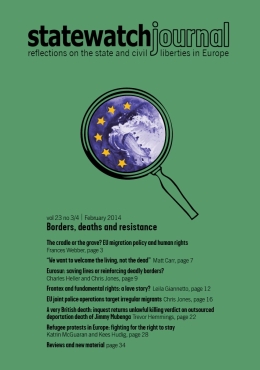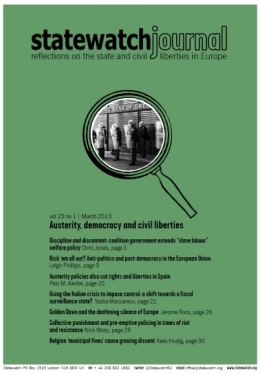Vol 23(2): Informants, spies and subversion
Topic
Country/Region
01 August 2013
Support our work: become a Friend of Statewatch from as little as £1/€1 per month.
Download the journal in pdf format
From the editorial: "[These essays] are broadly concerned with different types of informing. The intention is not to sort the “good” grasses from the “bad” but rather to interrogate the relationship between states and informers and better understand the role that they play not just in the pursuit of security and criminal justice, but state subversion and the pursuit of profit."
A duty to inform? The outsourcing of state surveillance responsibilities to the British public by Max Rowlands
The government is increasingly encouraging - and in some cases compelling - members of the public to monitor and report on each other’s behaviour. This practice disproportionately targets the poor, foreign nationals and the already marginalised, and contributes to the normalisation of surveillance within British society.
Shining a light on deadly informers: The de Silva report on the murder of Pat Finucane by Paddy Hillyard and Margaret Urwin
Numerous flaws and oversights in de Silva’s report highlight the need for a full scale independent public enquiry into the British state’s dealings in Northern Ireland. Security agencies tasked with keeping the peace acted beyond the law, lied to their political masters, leaked information to loyalists, told falsehoods in criminal trials, and recruited known murderers as agents.
Secrets and lies: undercover police operations raise more questions than answers by Chris Jones
The austerity policies implemented in response to what has generically come to be called “the crisis” have a stated objective: to prune the social gains that have been won over time. Fear is being used to coerce the population into accepting these cuts. This pruning process has affected practically every sphere of political, economic and social life to the extent that many citizen’s rights and liberties have been lost.
‘Grassing’: the use and impact of informants in the War on Terror by Aviva Stahl
The use of “grasses” and the deployment of undercover police are at the centre of Britain’s counter-terrorism policy. These practices foster a culture of suspicion and have a profoundly damaging impact on British Muslim communities.
“Every Man a Capitalist”: The long history of monitoring ‘unsuitable’ workers in the UK by Trevor Hemmings
“Blacklisting is the practice of systematically denying individuals employment on the basis of information, accurate or not, held in some kind of database.”
Neighbourhood patrols, vigilantism and countervigilantism in Spain by Gemma Galdon-Clavell
Vigilantism, neighbourhood patrols and state sponsored informing are long established practices in Spain, and have been facilitated in recent years by new technologies and the growth of social media.
Sanctions for stowaways: how merchant shipping joined the border police by Paloma Maquet and Julia Burtin Zortea
EU Member States are shifting responsibility for stowaways on board merchant vessels to carriers and are opposing any form of reception or support for irregular passengers in their territory. As a consequence, the maritime industry has developed strategies to remove migrants whilst avoiding delays in delivering shipments. Since 2001, the implementation of anti-terrorism policies and related security matters in the maritime sector has contributed to the emergence of preventive measures against a number of threats, including “irregular” migration. Beyond the professionalisation of insurance to “manage” stowaways, the sector has developed a growing - almost compulsory - outsourcing of law enforcement competences to workers at sea and in ports.
Also available in French: Quand la marine marchande seconde la police aux frontières: externalisation et soustraitance des contrôles migratoires dans le milieu maritime, pdf)
Reviews
Medea Benjamin, Drone Warfare: Killing by Remote Control, Verso Books (London) 2013, pp.231
New material
Reports and research sources covering civil liberties, immigration and asylum, law, military, policing, prisons, racism and fascism, and security and intelligence.
Download the journal in pdf format
Our work is only possible with your support.
Become a Friend of Statewatch from as little as £1/€1 per month.
Previous article
Vol 23(3/4): Borders, deaths and resistance
Next article
Spotted an error? If you've spotted a problem with this page, just click once to let us know.

